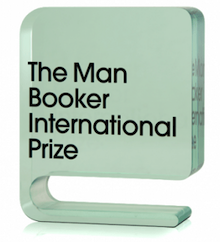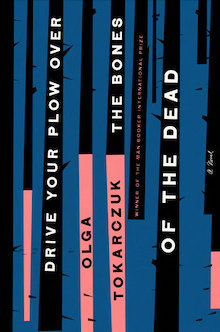The Most Anticipated Translation of 2019
Drive Your Plow Over the Bones of the Dead by Olga Tokarczuk, translated from the Polish by Antonia Lloyd-Jones (Riverhead)
Drive Your Plow Over the Bones of the Dead may well be the most anticipated translation of the season. Olga Tokarczuk’s second novel in as many years is a mystery novel that never declares itself as such. Despite all the deaths that litter it—the book starts off with Big Foot’s demise choking on a bone from a deer that he had poached—the novel is more of a character study of its quite quirky narrator, Janina Duszejko, who valiantly tries to convince the police that all four deaths are the result of animals taking revenge against hunters.
The lack of detailed investigations, the absence of a plucky detective putting the pieces together is one of the book’s great charms. It redirects the focus from the typical concern for justice and human lives, and instead allows Janina to unfurl her life story—as an engineer of bridges turned schoolteacher turned caretaker of summer houses, vegetarian, astrologist, co-translator of Blake’s poetry, and devoted animal lover—and her dislike for hunters of all stripe, especially one particular5 group of poachers, whose connections to the local law enforcement and politicians takes on a conspiratorial air.
There are actually two mysteries in the novel, neither of which are hard to solve: the deaths of the four hunters, and the mystery of what happened to Janina’s “Little Girls,” her dogs that are absent for unexplained (although quite easy to surmise) reasons. I don’t want to give away any spoilers (although if there’s a true weak point to this book, it’s that the answers to the mysteries are pretty obvious, right from the start), but these two mysteries are intertwined.
Although the deaths are the engine behind the novel’s plot, the book really runs off of Janina’s voice. The success of this is a true testament to Antonia Lloyd-Jones’s skill as a translator. In one of what could be a half-dozen or more qualifiers, I will admit that I’m friends with Antonia, have known her for years, and am working with her on a few books. I’ve also read a number of her translations, and I was very impressed how this book doesn’t sound like Antonia. This is a problem that perceptive readers can pick up on, and something that translators have to grow their way out of as their careers progress. Even if you let the original text guide you, there are turns of phrase, certain rhythms, subtle tics that show up in most renderings. It’s not intentional, it’s not even conscious, but it’s something I see in my students’ work that’s 100% absent here. Which is maybe my way of saying something meaningless like “a smooth translation” but isn’t, really.
*
Plow is a fast read, an enjoyable book, one that has a strong, compelling voice and enough plot points to keep you engaged. (Although I’m not sure about the overall pacing, with the ending revelation feeling both obvious and too abrupt all at once.) But why, exactly, is it the “most anticipated translation of the year” as I postulated above? Did you even pause on that and think, “No way! XXXXXXX is the most anticipated!” I’m willing to bet that most everyone just passed right over that statement, or took it as “Internet Objective.” (Those statements online that are clearly hyperbolic, but an acceptable level of hyperbole because it’s 2019 and we can’t exaggerate enough to get a reaction anymore.)
Given the number of reviews of Plow already up on BookMarks . . . I might actually be right. But why is that the case? Listed below are ## reasons why people are looking forward to this particular book, along with my personal assessment (on a scale of 1 to 10) as to how meaningful these aspects really are:
An Audience That’s Been Reading Olga Since Primeval and Other Times (2/10)
 I absolutely loved this book when Twisted Spoon brought it out. (This blog post from 2011 is so lame! And the opening sentence should be “were” not “was.”) At that time (2010), I was reading all of their titles, each one unique, dark, adventurous. But they were based in Prague, with pretty shitty U.S. distribution, so I was probably one of a dozen people who read this. (Although I distinctly remember a very well-respected book critic telling me that this book was not very good and that they couldn’t understand why I liked it. The things the brain remembers—the dramatic, the negative, the moments of self-doubt.) It’s exactly why I got samples of both Flights (called “Runners” at that time) and Drive Your Plow and desperately wanted to publish them. Alas, over the course of many years, multiple authors who were on our editorial board fought against this possibility, so we never even got to the point of making an offer. We could’ve been Fitzcarraldo!
I absolutely loved this book when Twisted Spoon brought it out. (This blog post from 2011 is so lame! And the opening sentence should be “were” not “was.”) At that time (2010), I was reading all of their titles, each one unique, dark, adventurous. But they were based in Prague, with pretty shitty U.S. distribution, so I was probably one of a dozen people who read this. (Although I distinctly remember a very well-respected book critic telling me that this book was not very good and that they couldn’t understand why I liked it. The things the brain remembers—the dramatic, the negative, the moments of self-doubt.) It’s exactly why I got samples of both Flights (called “Runners” at that time) and Drive Your Plow and desperately wanted to publish them. Alas, over the course of many years, multiple authors who were on our editorial board fought against this possibility, so we never even got to the point of making an offer. We could’ve been Fitzcarraldo!
But the point isn’t to lament yet another on the long list of misses that I’ve had in my life (see: The Savage Detectives reader’s report I commissioned in 2001), but to say that not one single review mentioned Primeval or House of Day, House of Night, which was published by Northwestern University Press. There was no long-term growth of Tokarczuk’s English-reading audience; her readership materialized instantly and for other reasons.
The Astrology Parts of Drive Your Plow (3/10)
I read some article recently about how millennials have replaced religion with astrology. Which I have no problem with! I know lots of my friends like to punk on all beliefs (I used to be friends with someone whose whole brand was based around not believing in anything and taking a sarcastic, ironic, caustic approach to everything someone might incorporate into their life), but that sort of “scientific rationality” is not for me. Hidden patterns? Forces that are just beyond our understanding? Things that can’t be explained in school-board approved textbooks? SIGN ME UP.
In a natal Horoscope the date of birth determines the date of death as well. That’s obvious—anyone who has been born is going to die. There are many places in the Horoscope that point us toward the time and nature of death—one simply needs to know how to spot and connect them. For example, one has to check the transitory aspects of Saturn to the hyleg, and what’s going on in the eighth house. Also to cast and eye of the relative position of the Lights—meaning the Sun and Moon.
I’m trying to find out if this sort of approach—“transitory aspects of Saturn to the hyleg” and “eighth house”—is normal astrology speak or nonsense, and hoping that it’s nonsense. Not because I’m anti-astrology (again, hidden patterns, academics being wrong, all that appeals), but because I want to imagine that Janina’s mental instabilities are evident in this—if you know the language.
While trying to find this quote, I found one other paragraph that I love, and that might not deserve its own header, but is why I would recommend you read this book:
I grew up in a beautiful era, now sadly in the past. In it there was great readiness for change, and a talent for creating revolutionary visions. Nowadays no one still has the courage to think up anything new. All they ever talk about, round the clock, is how things already are, they just keep rolling out the same old ideas. Reality has grown old and gone senile; after all, it is definitely subject to the same laws as every living organism—it ages.
The Controversy over The Books of Jacob (6/10)
Now we’re talking. One of the first times most people heard of Tokarczuk was when this 1,000 page book won the Nike Award and was attacked by Polish nationalists who, because we live in one of the worst possible worlds, are incredibly anti-Semitic and assholes. (Just what the world needs now, more assholes who believe they’re more special than others. Every day it feels like there are more white nationalist and fewer glaciers, which will, literally, be the death of us all.)
Although this book has yet to appear in English translation (Jennifer Croft—read her memoir, Homesick—is working on it), the death threats and controversy registered in the international press and all of a sudden, Olga Tokarczuk was an author “worth looking into” by many editors.
The Movie Version of Drive Your Plow which Is Called Spoor (3/10)
Nah. I’m not even sure most English readers are aware that this exists. (1,377 YouTube views. Or more, depending on how many people are reading these words and clicking this video.) Here’s a trailer in case you’re interested:
It’s from Riverhead (9/10)
So, I’m working on a book about baseball sabermetrics (not the actual sabermetrics, but the ideas that drive how to evaluate talent and success), behavioral economics (mostly decision making and prospect theory), and publishing (because I know nothing else), and am working on a section about whether or not publishing is a zero-sum game. There are elements by which it is (limited shelf space, limited reviews, static amount of money spent on books for a good number of years), and yet, there’re no real limits in which for every book that “wins,” one “loses.”
Maybe.
When you’re Open Letter and not Riverhead, it feels like a zero-sum game. Indie bookstores have a limited amount of money, and have to spend that money on the books that are most likely to sell. And a massive corporate press, with a legit marketing budget and multiple employees pimping a given title (versus a few employees doing multiple jobs) is much more likely to “win.” And if you assume it’s going to win, then you buy more copies of that book and fewer of the one from Open Letter and, well, Drive Your Plow sells better. It’s tautological in a way. It will always sell more because more copies are readily available. Amazon hasn’t altered that dynamic. The most popular books sell via all retailers. Size and power matter.
The Cover (8/10)
Covers are the number one influence on whether or not someone buys a book. But this cover? It’s fine. (ADMISSION: I think most everything is fine. I have a whole post about this pre-written for when I start my “Evaluation of Books with No Metadata” series, but in short, most all of the books I read are between a 5 and a 10. Which is a weird sort of self-involved bragging, but also a way of saying that a book that I think is a 7 is fine to me, but also a really good book! Numbers are relative and shit.) It’s kind of an Open Letter cover (see Landscape in Concrete), and is mod in a way that I like, but that isn’t spectacular. Riverhead’s Flights cover isn’t necessarily my thing either.
But I’m not most people, and I’ll be this stands out really well on a front table at both an indie store and B&N.
The Man Booker International for Flights (10/10)
 This is the one, right? If Flights doesn’t win the Man Booker . . . Check that: If Flights isn’t longlisted for the Man Booker, no one gives any fucks about Drive Your Plow. Full stop. Even if it is a finalist for the 2019 Man Booker International. (Which it is, and, frankly, biasedly, I hope it wins. Go Antonia!)
This is the one, right? If Flights doesn’t win the Man Booker . . . Check that: If Flights isn’t longlisted for the Man Booker, no one gives any fucks about Drive Your Plow. Full stop. Even if it is a finalist for the 2019 Man Booker International. (Which it is, and, frankly, biasedly, I hope it wins. Go Antonia!)
Is there any other award in the world that matters as much to translation as this one? No.
That People Decided to Give Olga a Chance (7/10)
This is hard to articulate, but I’m going to try.
For years, the translation community has both acknowledged and fought against the idea that readers are “scared” of translations. When it served our purpose, we were quick to point out that readers tend to choose books by Americans over those by “foreigners.” And at the same time, when we were lobbying publishers to do more international books, we could easily trot out the argument that “readers love good books—translated or not! Just look at Ferrante!”
What if it’s all a lot simpler than that? There are certain books that the community of readers is open to giving a chance, and certain books they aren’t. There’s not necessarily a rhyme or reason to why book X and not book Y, but there are books that everyone’s like, “OK, let’s accept this and read it before we pass judgement” and other times that the reading community is like, “nice that it exists, but not my thing.” The reasons why the masses react the way they do—because it’s never as individual a decision as we wish it were—is the Holy Grail of book marketing. Is Drive Your Plow the best book in translation to come out in 2019? I personally don’t think so, and would be surprised if more than 50% of readers thought it was. But it’s one of a very small handful of titles in translation that a significant audience will give a chance.
I’m not in a mental space—right now—to explain the intricacies of this, I can think of all the books that the public won’t give a chance, books by Asian women that haven’t won awards, most everything (well, probably everything) from the Baltics, any translation with a stodgy university press cover, books set in places with too many diacritics. In many ways, Olga is the exception that proves the rule. How many other Polish female authors can you name? (There are fourteen—14?!—in the Translation Database.)
*
I’ve been really struggling with the idea of these posts for the past week or two. I know that I have a fraction of the readership that BookRiot or LitHub has, and that, at the same time, I’m wicked militant about not changing my approach—I don’t want to write fluff, but want to mix together a lot of ideas about math and society and unseen influences in a way that’s both illuminating and (on my best day) entertaining.
The big problem I struggle with is that my analysis of behavior comes off as dismissive or reductive—at least as regards the book in question.
That’s a flaw in my writing ability, not my beliefs. All the books I write about—even if I crap on them partially in jest, partially because I’m a curmudgeon who is about to turn mid-40s, partially because I’m chasing that dragon of unfettered joy that you can experience when you read a masterwork for the first time ever—are good! Buy them. And buy an Open Letter book while you’re at it. We have a ton of books as good as Drive Your Plow. That’s not to dismiss this particular book! It’s just that there are so many great books, but we as readers only give a handful a chance. Which is a missed opportunity. So many missed opportunities.
Will we do a Two Month Review on The Books of Jacob? We will. For sure. We’ll read it, bait Polish nationalists, get death threats. And support Olga—a very talented, uncompromising author. Whose Primeval and Other Tales is also worth getting ahold of.


Thank you author. keep it up.
Nice post author. Thank you. keep going on.
Nice post. Thank you. Keep up the good work.